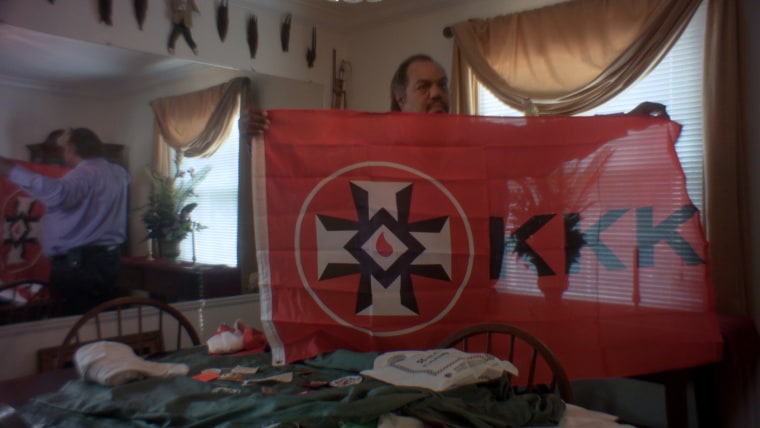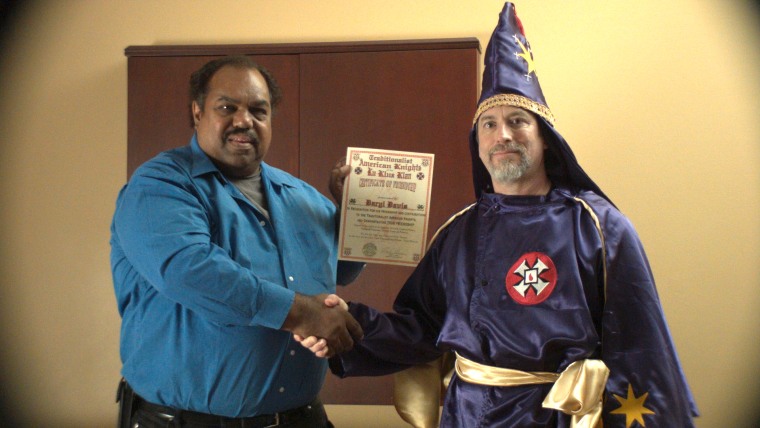For more than two decades, Daryl Davis, an African-American musician, has been going out of his way to befriend members of the Ku Klux Klan and other white supremacist groups in the hopes of persuading them to recognize their common humanity. Now he is the subject of a new documentary set to debut at SXSW this weekend, and the timing of the film could not be more fortuitous.
Davis began his crusade by asking himself the existential question: “How can you hate me when you don’t even know me?” After a chance meeting with a member of the KKK following a gig, Davis began to reach out to members of hate groups, and he found that the more willing he was to hear them out, the more open they became to embracing him. More than two dozen white supremacists have since renounced their ideology of hate in part because of Davis’ peace offering. And as part of that process, they have symbolically handed over their Klan robes and paraphernalia to him.
His journey forms the backbone of “Accidental Courtesy: Daryl Davis, Race & America,” but it’s not lost on the film’s director Matt Ornstein that his two-plus-years-in-the-making project is debuting amid renewed national attention on the culture of white supremacy due to activity surrounding the presidential campaign of Donald Trump. So far this election cycle, self-identified white nationalists have recorded robocalls in favor of the GOP front-runner, attended and, in at least one case, broadcasted from his rallies, and even the candidate himself has gotten into hot water for not fully dissociating himself from racial hate groups in the past.
RELATED: Donald Trump’s white supremacist problem
“I think that these are things that we definitely needed to be talking about before, and if this is what it takes, that’s sad, but I guess that’s ultimately a positive thing,” Ornstein told MSNBC on Monday. “In regards to the film itself, I feel like it makes it more timely, unfortunately.”
As Davis says in the film: “The Ku Klux Klan is as American as baseball, apple pie and Chevrolet.”
Ornstein said he was drawn to the “everyday heroism” of what Davis was attempting to do, even while, as a Jewish-American, he felt real trepidation and ambiguity about the value of offering a platform for white supremacists to spout their views. “These people have been accustomed to a way a life, to a form of crooked hegemony that obviously cannot and will not last forever and I think they have a hard time letting go of it,” he said.
“These people have been accustomed to a way a life, to a form of crooked hegemony that obviously cannot and will not last forever and I think they have a hard time letting go of it.”
There are real risks involved in Davis’ passion project. Although he is no apologist for white supremacists and is fully aware of their community’s propensity for violence, he can be viewed as either a threat or a tool depending on a hatemonger’s point of view. According to Ornstein, Davis’ wife does not appear in the film “because he fears for her safety” and the director himself said “the hair stood up on my neck” after some of the encounters caught on camera with white supremacists.
Still, Ornstein believes that Davis feels the “benefit of the people who go out of circulation from the [white supremacist] movement, of the people who realize the error of their ways … he thinks that vastly outweighs the collateral association with violence.”
Not everyone is impressed with Davis’ efforts. Mark Potok, a senior fellow at the Southern Poverty Law Center, which aggressively seeks to destroy and marginalize hate groups through the legal justice system, criticizes Davis’ “retail” strategy of racial reconciliation in the film. And in the movie’s climax, Davis has a heated confrontation with Black Lives Matter activists Tariq Toure and Kwame Rose, who tells him: “Infiltrating the Klan ain’t freeing your people.”

“I saw it as sort of the left and the right hand — Martin [Luther King] and Malcolm [X] and ultimately Daryl and Tariq and Kwame, they really want the same things, substantially, the differences are minute. The difference is in approach,” said Ornstein.
RELATED:New Documentary Series Investigates 'Hate in America'
The debate is an old one — integration or independence — and it has become a more generational conflict as evidenced by the tension in the scene. Toure makes a compelling argument for economic power trumping Davis’ outreach and Rose questions the efficacy of persuading roughly 25 klansmen to give up their robes when hundreds of hate groups still stalk the nation and their influence appears to be growing.
“Both sides do have valid points on the subject of course, and they’re both doing their best to help out. I think Daryl ultimately has only helped the people you see in the movie and that’s a substantial accomplishment and more than a lot of people including myself can say,” Ornstein told MSNBC.
Davis has made numerous talk show appearances and penned books on his experiences, but the film could open up a whole new audience to his unconventional method of spreading the civil rights gospel. “I never set out to convert anybody,” he says in the film, and yet now he has people reaching out to him to find common ground. Ornstein hopes the movie will at the very least provoke conversations about what the best way is to fight racial prejudice and ignorance going forward.
“That would be my greatest hope for it, that it would spur discussion along those lines,” he said.
This story first appeared on msnbc.com
